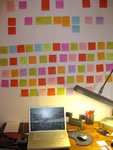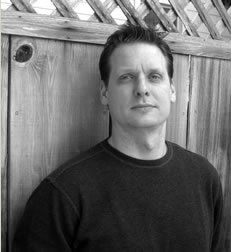|
 I work in a collective called The Sanchez Grotto. It's an old Victorian converted into offices. For an absurdly reasonable monthly sum, I have a tiny room and a door that locks. There's a picture of Charlie Parker on the wall, a calendar, and hundreds of multi-colored Post-its, each scrawled with a character arc or chapter sequence from my new crime novel Smarter Than You, Deader Than Them. Possibly it's not all that smart, since the book has garnered nothing but semi-polite rejections. It might be the title. Or the bad karma from my Post-it arrangement, which looks suspiciously like the background from a scene of St. Elmo's Fire. Demi Moore and Andrew McCarthy are arguing about Rob Lowe. Rob, because he wears a bandana and holds a saxophone, is obviously a Musician. Andrew, because of his tweed overcoat and manically scribbled Post-its, practically radiates Brooding Novelist. Or maybe irradiates. Either way, it doesn't end well for him. I work in a collective called The Sanchez Grotto. It's an old Victorian converted into offices. For an absurdly reasonable monthly sum, I have a tiny room and a door that locks. There's a picture of Charlie Parker on the wall, a calendar, and hundreds of multi-colored Post-its, each scrawled with a character arc or chapter sequence from my new crime novel Smarter Than You, Deader Than Them. Possibly it's not all that smart, since the book has garnered nothing but semi-polite rejections. It might be the title. Or the bad karma from my Post-it arrangement, which looks suspiciously like the background from a scene of St. Elmo's Fire. Demi Moore and Andrew McCarthy are arguing about Rob Lowe. Rob, because he wears a bandana and holds a saxophone, is obviously a Musician. Andrew, because of his tweed overcoat and manically scribbled Post-its, practically radiates Brooding Novelist. Or maybe irradiates. Either way, it doesn't end well for him.
When I started writing full-time, by which I mean spending at least two hours a day not tossing off catalog copy—The Patterson six-pocket knit pleat mini is ideal for young moms or girls on the go!—I was still working from home. This was before my office was stolen by my infant daughter, with her boundless needs and disproportionate size/space requirements. But in those days it was still a back room with a desk and a laptop and lead-lined windows overlooking a perpetually foggy garden. It was serene and quiet. It was genuinely perfect for writing. When friends would come over, I'd stand there with a glass of wine and say something like "Yup, here's where the alchemy happens." Except it was a lie. I hardly ever got anything done. All day, car alarms chirped and screeched, triggering one another down the block. Ham sat darkly in the fridge, ready to be sliced and assembled between layers of artisanal cheese. But mostly it was the undelivered mail, waiting for envelopes to bang through the metal slot like a losing hand of canasta, each #10 legal sealed with potential acceptance or rejection. It was just too easy to get distracted. And so I did. Day after third-trimester day I stared at my laptop, tapping the R key in time to the second side of Kansas' Leftoverture, until a noise finally came from the other room. More like a yell of distress. We raced to the hospital, where the belly of my distended wife was distended no more. There was barely time to delete the half-chapter of clotted prose I returned to, before a little girl kicked and gurgled and sighed, brazenly demanding milk in exactly the spot my desk used to be.
From then on, I woke early and headed to the local café, volume up and earbuds wedged, writing in the midst of clamor. It was liberating. Latte steam settled like a muse. I described entire lines of polyblend outerwear in less than five hundred words. I captioned the desire for Israeli paratrooper boots and Moroccan-weave scarves with equal panache, still having time to knock out all manner of short fiction, literary in nature and unpublished in reality. But still.
The problem was, after a month, like Gregor Samsa's beetle, I morphed into That Guy. The one at the good table by the window, wincingly hunched, absorbed in his laptop. That Guy never plays chess for refills, or thumbs the house copy of Flaubert with a sly grin. He never punctuates an inappropriate story with two-fingers of pinched scone, or denigrates free markets in his artfully faded Che T-shirt. That Guy's daily disinterest tends to make the rest of the cafe feel like they're missing out on something. Could he be a famous poet? An underground music producer? A highly-paid programmer of elf-fighting code? Just what's so interesting on that screen?
I began to notice the stares. No matter how much I tipped, the baristas appeared equally mistreated. Every third person seemed to pause, bagel in hand, to consider asking why I didn't have a job. Or, more importantly, why I thought it was okay to make cream-space by pouring a third of my dark roast into the browning fern.
So I visited multiple cafes, going to a different location each day of the week. Everyone loves a regular who's not too regular. When baristas asked what was so interesting on my laptop, I said "my James Fenimore Cooper dissertation," which never failed to be met with glazed silence. I was able to write a novel and a half-dozen short stories on the five-cafe plan.
But then I began to hear whispers about this mysterious Grotto. It took me a while to track it down. When I did, I more or less pounded the front door, day after day, begging to be let in. Eventually they found me space in a corner of the kitchen on a trial basis. Barely a year later, I had my own office. It's great being among my own kind. I can bloviate about unresponsive agents or the method of tabulating best seller lists or the true meaning of Stet, with almost no fear of being a bore. It's been many years since friends or family wanted to hear peep-one about my latest protagonist, but at the Grotto there's always someone a door away who will listen, if only for the opportunity to tell me about theirs. Every city should have a Grotto. All it takes is leasing a storefront in disrepair, turning it into little offices, then attending art openings with free cheese until you elbow enough writers to cover the rent. Suddenly it's like being part of a Left Bank salon. It's long lunches and books signings and wine tastings. It's fund raisers and ascots and being a member of a community of potential Gertrude Steins. Or at least Fred Steins.
These days, I frequently find myself in the Grotto late at night, staring guilt-free at the flickering blue screen. As a result, my current novel has a lighter, gentler tone. The characters less often blurt epithets, or threaten one another with inexplicably handy cudgels. Even the title speaks to a newfound creative maturity and centeredness. It's called, at least for now, The Safe Is Empty, But The Soul Is Full.
|



